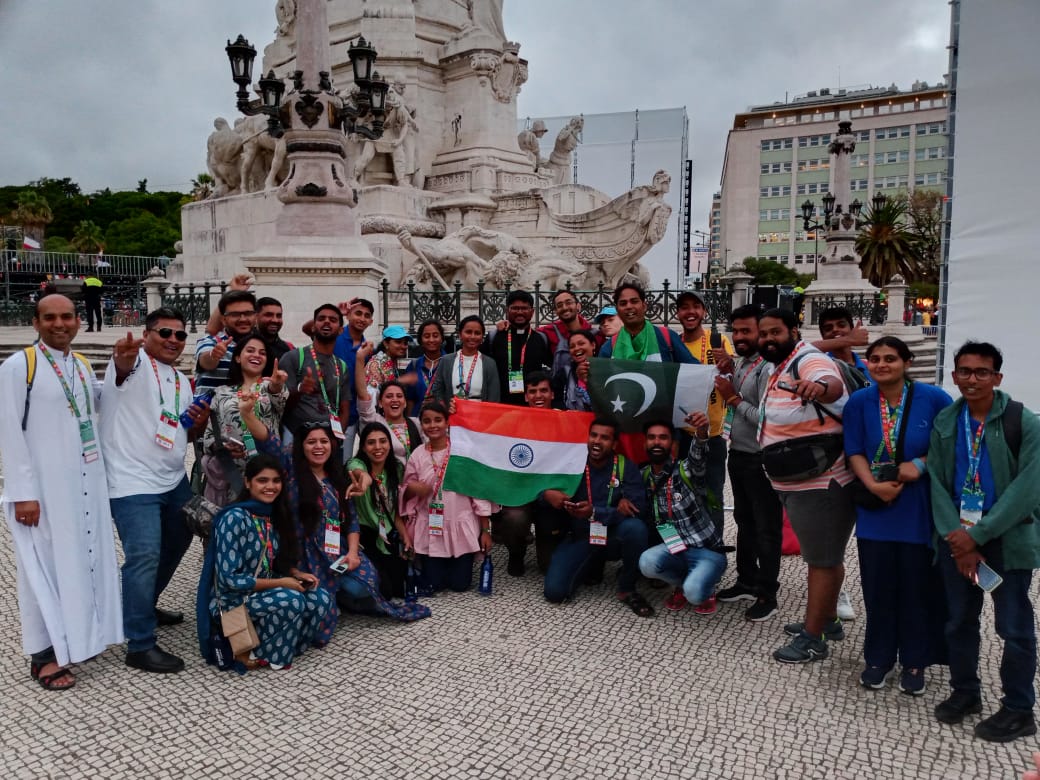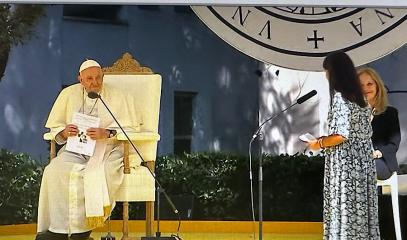For young Indians and Pakistanis, meeting in Lisbon for the WYD is a 'unique experience'
At the Portuguese Catholic University, Francis urged students to be teachers of hope, and told them to “replace your doubts with dreams: do not remain hostage to your fears”. At the nunciature, he prayed with young Ukrainians. In Cascais , at the Scholas Occurrentes, he gave a final “touch” to a three-kilometre mural .
Lisbon (AsiaNews) – World Youth Day is a "unique experience" that allows people to get to know others from all over the world. Above all it favours relations between people of nations, often in conflict with each other.
This is the case for Indian and Pakistani Catholics, says Godfrey Malu, who hails from the Archdiocese of Bombay (Mumbai). So far, during his stay in Lisbon, he "met some young Pakistanis" who were "really happy to meet us".
"We Indians and Pakistanis got together and took pictures,” he told AsiaNews, “showing that we are one body" of the Church. “Although we come from different nations (both nuclear powers), we are one,” he added. This enables us to “live a unique moment and reach out to one another.”
The young Catholics from Pakistan and India are but some of the million-strong sea of young people from around the world, meeting from 2 to 6 August in Lisbon, after heeding Pope Francis’s call to take part in the 37th World Youth Day.
Since his first meeting with Portuguese authorities, the pontiff has renewed his appeal for peace and the search for new ways of coming together and engaging in dialogue, even where walls and war keep people apart.
Godfrey agrees. In fact, this is something he personally experienced with young Pakistanis and fellow Indians. “Although we come from different backgrounds, we are one" in Christ, he insists.
For his part, the pope was busy today with his official WYD duties. Before setting out, he met a group of youths from Ukraine, to whom he expressed his closeness, full of sorrow and prayers.
Afterwards, he travelled to the Portuguese Catholic University (Universidade Católica Portugesa), where four students, including Mahoor, an Iranian refugee, spoke. In the second meeting of the morning, the pontiff met with young people from the Scholas Occurrentes, at its headquarters in Cascais.
At the Catholic University, he reminded the students that in a Catholic educational establishment, “each part is related to the whole, while the whole is to be found in each of its parts.” Hence, scientific skills need personal growth, which is an integral part of the journey every pilgrim undertakes, moved by the courage to “persevere in seeking and in the risk of the journey”.
The pontiff put a lot of emphasis on the word “pilgrim,” which literally means to put aside one’s “daily routine and choose to set out on a different path, moving away from our comfort zone”.
“The notion of ‘pilgrimage’ nicely describes our human condition for, like pilgrims, we find ourselves facing great questions that have no simple or immediate answers, but challenge us to continue the journey [. . .] To seek and to risk: these are two words that describe the journey of pilgrims.”
Francis noted that in the Middle Ages, people “greeted each other by exclaiming ‘Ultreia’, and responding ‘et Suseia’. These expressions encourage us to persevere in seeking and in the risk of the journey”.
Citing Portuguese poet and writer, Fernando Pessoa, the pontiff urged his student audience to take risks, not be afraid of feeling "restless". Existing challenges are "enormous" and pleas are "painful", but, he warns, “let us find the courage to see our world not as in its death throes, but in a process of giving birth” that puts “the human person at the centre.”
From this perspective, the university does not exist just to perpetuate itself as an institution. “Self-preservation is always a temptation, a knee-jerk reaction to fears that distort our view of reality.” On the contrary, courage is needed to “replace your doubts with dreams: do not remain hostage to your fears, but set about working to realize your goals!"
“If someone who has benefited from a higher education – which nowadays in Portugal, as in the wider world, remains a privilege – makes no effort to give something in return, they have not fully appreciated the value of the gift they received.”
For the Holy Father, academic degrees “should not be seen merely as a licence to pursue personal wellbeing, but as a mandate to work for a more just and inclusive – that is, truly progressive – society.”
For young people, this means bringing about change and transformations, asking themselves, "how can universities, especially the Catholic university, contribute to this?”
“Yours can be the generation that takes up this great challenge. You have the most advanced scientific and technological tools, but please, avoid falling into the trap of myopic and partial approaches.” Look to the future, while remembering the past.
The pope listed some of the most urgent priorities: a piecemeal Third World war, integral ecology, a suffering planet and the pain of the poor, desertification and refugees, migration and falling birth rates, the material dimension of life within a spiritual dimension.
“Instead of polarized approaches, we need a unified vision,” he said. “In every age, one of the most important tasks for Christians is to recover the meaning of incarnation. Without the incarnation, Christianity becomes ideology; it is incarnation that enables us to be amazed by the beauty of Christ revealed through every brother and sister, every man and woman.”
Emphasising the role of women, he praised the university's decision to name their new academic chair, dedicated to the Economy of Francesco, after Saint Clare.
“The contribution of women is indeed essential. In the Bible, we see how the economy of the family is entrusted largely to women. They are the real heads of the household, possessed of a wisdom aimed not merely at profit, but also at care, coexistence, and the physical and spiritual wellbeing of all, including the poor and the stranger.”
In concluding, the pope reminded the young people to study the Global Pact on Education, to show passion for it, especially when it teaches to accept and include everyone.
After the university, the pope went to Cascais to meet more young people, enrolled at the Scholas Occurrentes. Here he was given the opportunity to give a "final touch" to a three-kilometre mural, which has been in the making for some time as part of a project called “Life between the worlds".
As part of the WYD, more than 2,000 people contributed to this work of art – senior citizens, young people, children from various religious backgrounds and nationalities, rich and poor, religious believers and non-believers. With a final touch from the pope, it was completed today.
"Life between worlds" seeks to embody the pontiff’s educational vision, stressing the importance of being in between, a place where people can meet, and where they can meet the world, between the world and life, where life regains its meaning.
Scholas Occurrentes is an international educational foundation established under pontifical law, created by decree of His Holiness Pope Francis. Present in five continents, it operates as a network of more than half a million schools and educational facilities.
Its mission is to create a culture of encounter.
(Nirmala Carvalho contributed to this article)
06/08/2023 14:48
02/08/2023 17:48








.png)










